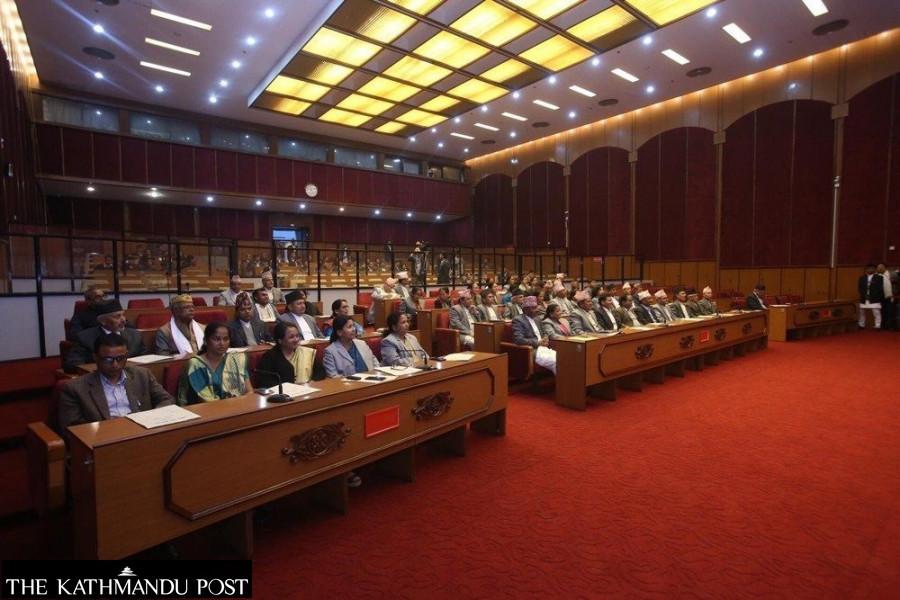National
National Assembly passes first amendment to Citizenship Act
Revision clears the path to citizenship by descent for children born to Nepali parents with citizenship by birth.
Post Report
The National Assembly on Thursday endorsed the first amendment to the Citizenship Act, 2006 clearing legal hurdles to acquiring citizenship based on descent by the children of those parents who had acquired citizenship by birth.
The bill that was endorsed by the House of Representatives on Friday through a majority vote was endorsed by the upper house amid reservations from the main opposition CPN-UML and independent lawmakers. The amendment will become law after President Bidya Devi Bhandari authenticates it.
Although the amendment has cleared the path to citizenship by descent for thousands of children born to Nepali parents born before April 12, 1990, it has some gender-discriminatory provisions. Those who were born in Nepal before April 12, 1990 have got citizenship by birth as per the Act. But their children have not been able to acquire citizenship based on descent, for lack of a law.
The amendment has retained a provision that a foreign woman married to a Nepali man can obtain naturalised citizenship once she starts the process to renounce her citizenship of the country of her origin. However, the provision does not apply to foreign men married to Nepali women.
“It is wrong to grant a foreign woman naturalisation immediately after marriage. There must be a cooling-off period,” said Khim Lal Devkota, an independent lawmaker at the Upper House. “Until then, she should be granted a permanent residency certificate so that she can enjoy all rights other than political and administrative ones.” Devkota voted against the amendment bill when Minister for Home Affairs Bal Krishna Khand tabled it for endorsement.
Though UML lawmakers demanded that there must be a seven-year cooling-off period before granting a naturalised citizenship, they remained neutral during the vote.
Bimala Rai Poudyal, a member of the National Assembly, said the bill is discriminatory against women. She demanded that both the foreign women married to the Nepali men and foreign men married to Nepali women should be granted citizenship after they spend a certain number of years in Nepal. “The constitution guarantees equality to both men and women, but the bill is discriminatory and contradicts the constitution,” she said in the upper house. “The amendment shouldn’t be endorsed without further revision.”
However, it was passed by an overwhelming majority of the upper house.
Presenting the bill for endorsement, Khand said as citizenship is a very sensitive issue, there must be a consensus among all parties while making citizenship-related laws. “We neither should be very rigid nor very liberal in granting citizenship,” he said. “The government will work seriously to ensure that the legal provisions are not misused. The many concerns of the lawmakers can be addressed through amendments in the days to come.”
The amendment also allows a child born in Nepal to a Nepali woman and whose father is unidentified, to get citizenship by descent. However, the applicant’s mother must make a self-declaration that the father “cannot be identified.” She will be liable for action if it is found that the claim that the father “cannot be identified” turns out to be wrong.
For the first time, the bill has a provision for Non-resident Nepalis, living outside the South Asian region, to acquire citizenship. However, they cannot exercise political and administrative rights.
As per the bill, the children can choose the surname and address of either their mother or the father while applying for citizenship. Similarly, one can get citizenship with a gender identity [besides man or woman] in line with the constitution. Article 12 of the constitution says a person who obtains the citizenship of Nepal by descent in accordance with the constitution may obtain a certificate of citizenship of Nepal through their father or mother along with a gender identity.
The citizenship certificate will have details of both father and mother of the child. Currently, the citizenship certificate has details of father, grandfather or husband. Likewise, granting citizenship to the orphans whose father and mother are not identified is another provision in the amendment. They will get citizenship based on the testimonials from the orphanages or the shelter house, or the respective local governments.




 18.12°C Kathmandu
18.12°C Kathmandu













